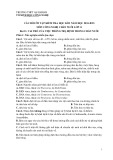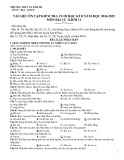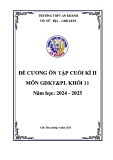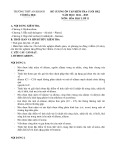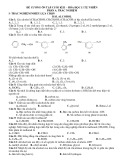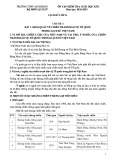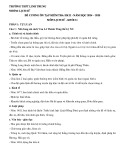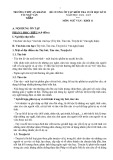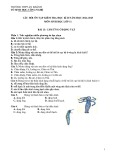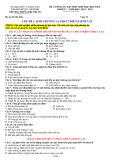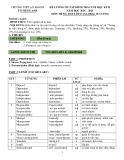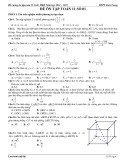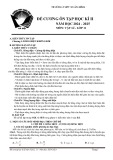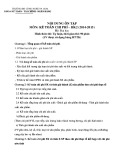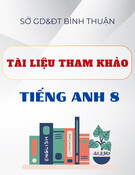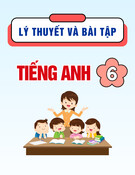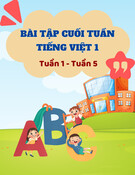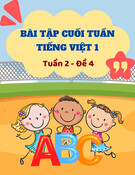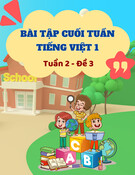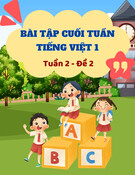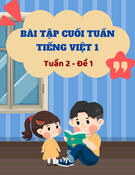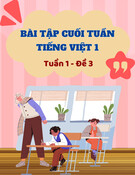
3
Question 20. “I'm not hot. I'm absolutely roasting” – “____”
A. You lucky thing! I'm sure you'll enjoy it. B. Let's go and cool down in the sea.
C. You'll get a lovely suntan. D. Maybe you've got a sun stroke.
Question 21. “I hear you've passed your exam. Congratulations!” – “____”
A. What a pity! B. You're welcome. C. I'm alright. D. Thank you.
Mark the letter A, B, C, or D to indicate the word(s) CLOSEST in meaning to the underlined word(s)in each
of the following questions.
Question 22. The balance and harmonious blending of various elements contribute to Taj Mahal's unique
beauty.
A. successful B. agreeable C. tasteful D. fitting
Question 23. My Son Sanctuary is a large complex of religious relics comprising more than 70 architectural
works such as towers, temples, and tombs.
A. royal B. precious C. holy D. valuable
Mark the letter A, B, C, or D to indicate the word(s) OPPOSITE in meaning to the underlined word(s) in
each of the following questions.
Question 24. Well, Mrs Baker, you'll be pleased to hear that George has made a dramatic improvement in
geography.
A. meaningful B. important C. insignificant D. steady
Question 25. Most of the students in our country are interested in pursuing higher education to get bachelor's
degrees.
A. following B. giving up C. trying D. interrupting
Choose the word or phrase among A, B, C or D that best fits the blank space in the following passage.
Hoan Kiem Lake is an attractive body of water right in the heart of Ha Noi. Legend has it that in the mid-
15th century, Heaven gave Emperor Le Thai To (Le Loi) a magical sword (26)_________ he used to fight
against the Chinese, the Ming aggressors, out of Viet Nam. After that one day when he was out sailing in the
lake, a giant (27)_______ tortoise suddenly grabbed the sword and disappeared into the depths of the lake.
Since then, the lake has been known as Hoan Kiem Lake (Lake of the Restored Sword) (28)_______ it is
believed the sword was taken to its original divine owners. The tiny Tortoise Pagoda, topped with a red star, is
(29)_______ a small island in the middle of the lake; it is often used as an emblem of Ha Noi. Every morning
around 6 a.m., local residents can be seen around Hoan Kiem Lake (30)_______ their morning exercise,
jogging or playing badminton.
Question 26. A. which B. who C. whom D. whose
Question 27. A. salty B. huge C. gold D. golden
Question 28. A. because B. so C. however D. although
Question 29. A. at B. above C. in D. on
Question 30. A. to do B. doing C. making D. to make
V. Read the passage, and choose the correct answer A, B, C or D for each question.
Ha Long Bay
Ha Long Bay is a group of offshore islands that is the best example of marine invaded limestone region in
the world. The Bay holds over 1,600 islands and islets. There are caves and grottoes, with stalactites and
stalagmites. Its limestone pillars are a unique natural feature of great scenic beauty and biological interest. The
great extent and the richness of its forms sets it apart from many other sites.
The natural beauty of the Bay lay hidden today under a very common fog. As I had already seen the
similar karst landscape in China a couple of years before, I certainly said that I was blown away by the beauty
of Ha Long Bay. We went onto one of the islands to visit the Surprising Cave - an indeed surprisingly big and
beautiful cave with three hollow chambers. We saw some monkeys here too, just outside the cave exit.
Part of the tour was half an hour of kayaking - enough to paddle a full circle around the main area. The






